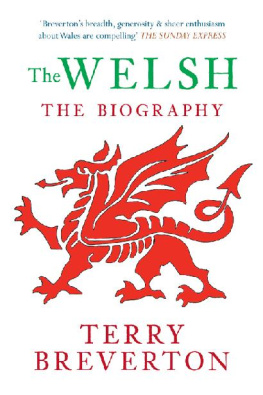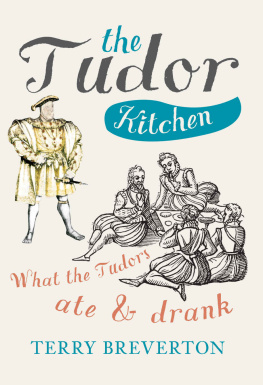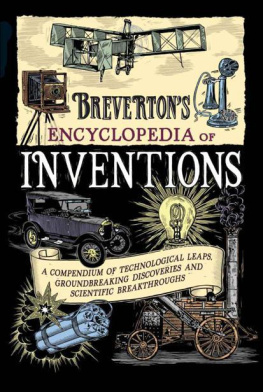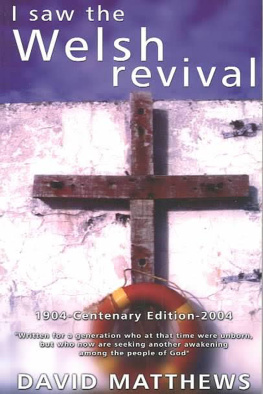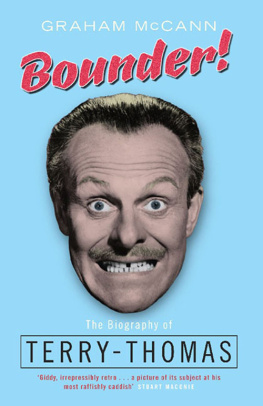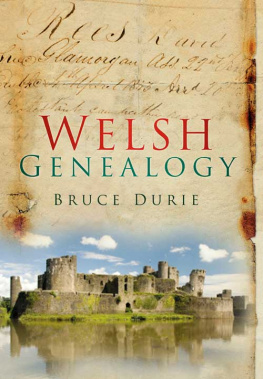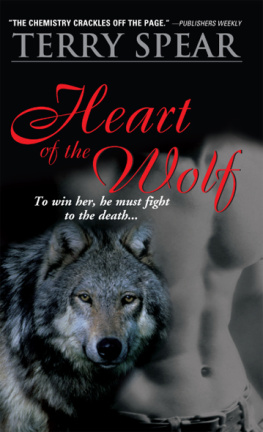Terry Breverton - The Welsh The Biography
Here you can read online Terry Breverton - The Welsh The Biography full text of the book (entire story) in english for free. Download pdf and epub, get meaning, cover and reviews about this ebook. year: 2012, publisher: Amberley Publishing, genre: Romance novel. Description of the work, (preface) as well as reviews are available. Best literature library LitArk.com created for fans of good reading and offers a wide selection of genres:
Romance novel
Science fiction
Adventure
Detective
Science
History
Home and family
Prose
Art
Politics
Computer
Non-fiction
Religion
Business
Children
Humor
Choose a favorite category and find really read worthwhile books. Enjoy immersion in the world of imagination, feel the emotions of the characters or learn something new for yourself, make an fascinating discovery.
- Book:The Welsh The Biography
- Author:
- Publisher:Amberley Publishing
- Genre:
- Year:2012
- Rating:5 / 5
- Favourites:Add to favourites
- Your mark:
- 100
- 1
- 2
- 3
- 4
- 5
The Welsh The Biography: summary, description and annotation
We offer to read an annotation, description, summary or preface (depends on what the author of the book "The Welsh The Biography" wrote himself). If you haven't found the necessary information about the book — write in the comments, we will try to find it.
The Welsh The Biography — read online for free the complete book (whole text) full work
Below is the text of the book, divided by pages. System saving the place of the last page read, allows you to conveniently read the book "The Welsh The Biography" online for free, without having to search again every time where you left off. Put a bookmark, and you can go to the page where you finished reading at any time.
Font size:
Interval:
Bookmark:

About the Author
Terry Breverton is the author of twenty books of Welsh interest, five of which have been awarded Welsh Book of the Month by the Welsh Books Council (more than any other author). He lives in Maesycrugiau in Carmarthernshire.
Praise for Terry Breverton
Owain Glyndr: The Story of the Last Prince of Wales
Accessible and highly readable THE WESTERN MAIL
An A-Z of Wales and the Welsh
A comprehensive overview of Wales & its people THE WESTERN MAIL
100 Great Welshmen
A celebration of the remarkable achievements of his countrymen THE GUARDIAN
100 Great Welsh Women
A fascinating read THE DAILY MAIL
Brevertons breadth, generosity and sheer enthusiasm about Wales are compelling
THE SUNDAY EXPRESS
The Welsh Almanac
A must for anyone with a drop of Welsh blood in them THE WESTERN MAIL

First published 2012
Amberley Publishing
The Hill, Stroud
Gloucestershire, GL5 4EP
www.amberley-books.com
Copyright Terry Breverton 2012
The right of Terry Breverton to be identified as the Author of this work has been asserted in accordance with the Copyrights, Designs and Patents Act 1988.
All rights reserved. No part of this book may be reprinted or reproduced or utilised in any form or by any electronic, mechanical or other means, now known or hereafter invented, including photocopying and recording, or in any information storage or retrieval system, without the permission in writing from the Publishers.
British Library Cataloguing in Publication Data.
A catalogue record for this book is available from the British Library.
ISBN 978-1-4456-0808-2 (PRINT)
ISBN 978-1-4456-1572-1 (e-BOOK)
Contents
Maen wir angenrheidiol bod Llais Werin Bobl Cymru yn gael ei glywed heddiw ni allwn ddibynnu ar ein gwleidyddion i gynorthwyo ni.
It is truly essential that the voice of the common Welsh people is heard today we cannot rely upon our politicians to assist us.
Introduction
The Romans wrote of the Silures in the south-east and southern marcher counties; the Demetae in Dyfed, the south-west; the Cornovii in the Cambrian Mountains of Powys and marches of central Wales; the Deceangli in the north-east and northern marches; and the Ordovicii in much of western Powys, the north-west and Anglesey. Wales has the oldest unbroken Christian heritage in the world, with four of these tribal areas having their own bishoprics at Llandaff, St Davids, St Asaff and Bangor, which remain today as our oldest British cathedrals. The importance of Wales to the Romans was shown in their great legionary fortresses and settlements of Wroxeter, in the heartland of the Cornovii and Gloucester on the eastern Silures borders. These were succeeded by Caerleon and Chester on what are now the Welsh borders in Silurian and Deceangli lands. Two of the three British legions were permanently stationed here. Later, fortresses and towns were also built at Carmarthen and Caernarfon, established on Demetae and Ordovician territories. The Romans used the Dee Valley to penetrate Deceangli territory by 48 CE, beginning to mine lead, and heading for the abundant copper mines at Great Orme and the agricultural riches of Anglesey. Legions followed the Severn to move westwards to secure the gold deposits at Dolaucothi and exploit lead and silver deposits. From Mid Wales and the plains of Monmouth and Glamorgan they headed westwards to establish Carmarthen.
After the Romans finally left in 410, Germanic barbarian invasion and expansion progressively hemmed the Christian British into Wales, the West Country, Cumbria and Strathclyde. The remaining British were known as Welsh to the invaders, a word of Germanic origin meaning foreigners. In the British language, they called themselves Cymry, meaning comrades. The unconquered part of Britain became known as Cymru to its indigenous people, and as Wales to the Angles, Saxons, Jutes and assorted pagan tribes. For 650 years, Wales kept the Germanic tribes largely out of their country, while also fending off seaborne attacks by the Danes and Irish. With the rapid end of Anglo-Saxon rule in England following the Norman Conquest of 1066, there was again a sustained defence against overwhelming French and English forces. All of England capitulated in four years, and its French-speaking kings established the Marcher Lordships of Chester, Shrewsbury and Hereford. The only expansion of wealth and power for these lords was into Wales, and the rich lowlands of south Glamorgan and south Pembroke were soon uneasily colonised. However, it was not until the treacherous murder of Llywelyn II in 1282 that French rule was established in Wales. This was not the end there were several rebellions, and the prolonged War of Independence of Owain Glyndr from 140015 gave Wales its sense of nationhood once again. With the French, he actually invaded England, a fact strangely ignored by English history books. Finally, we see the last successful invasion of England. In 1485, a largely Welsh army led by Henry Tudor overthrew the Yorkist Richard III, and the reign of the Tudors assimilated Wales into England. Henry VIIIs Act of Union of 1536 abolished Welsh customs and laws and tried to extirpate the language. Wales during Tudor times became a Protestant nation, and progressively turned to Nonconformism, what has been called a sweet and sour addition to the national psyche. While this undoubtedly saved the language, the more radical forms of Nonconformism did their best to destroy much of Welsh folk culture, and innumerable songs, dances and tunes were lost.
This book will be criticised by some politicians and historians. One expects and even hopes so. It will make a great deal of sense if the reader is Welsh. It is inspired by Iolo Morganwgs Y gwir yn erbyn y byd the truth against the world. It is critical of not only what has happened to Wales, but what is happening and what will happen. It is unlikely to appear in school or college syllabi because it is not blandly apolitical, but hopefully critical and informative. Hopefully it will be also read by other nationalities, as it is written by a Welshman who has a different perspective on Wales to many previous writers. As such, the volume is uneven. The minimal contribution of hundreds of churchmen who fill the Dictionary of National Biography is skipped over, while men like Hywel Dda, Bart Roberts, Henry Morgan, Robert Owen, David Davies, John Charles and Jimmy Wilde are given disproportionately longer entries. Henry Morgan, possibly Britains greatest military leader, vastly outnumbered in six expeditions deep into Spanish territory, is seldom mentioned. Yet without his successes, Charles II may have been toppled from the throne, and the United States of America could have been Spanish-speaking. It is also a book which will not totally please academics, as to fully index, annotate and reference it would lead to an uneconomic volume of at least twice the length. Much has to be omitted from over two millennia of history.
Thus this book is incomplete the most informative and instructive parts of Welsh history have been included, as always by this author from a Welsh perspective. This is a deliberate attempt to rewrite our national history, not blinkered by the standard Germanic version of British history, which usually begins with the German pagan invaders variously known as Saxons, Angles, Frisians and Jutes. Even the most recent television programme on the history of Britain the historian Michael Woods 2012 TV series The Story of Britain begins with the leaving of the Romans and the Germanic invasions. It is always unacknowledged that the British-speaking Britons were here at least a millennium prior to that date. Many people mock the British language, Welsh, but Brythonic was the language of Britain for well over 2,000 years before modern English evolved in Tudor times. Most Welsh history books neglect the distant past, and this work aims to rectify that situation, with more content on the times before the Normans came, and less on the better-known seventeenth to twentieth centuries. There is also the authors opinion upon whether Wales as a nation has any future in the final chapter, on the twenty-first century.
Next pageFont size:
Interval:
Bookmark:
Similar books «The Welsh The Biography»
Look at similar books to The Welsh The Biography. We have selected literature similar in name and meaning in the hope of providing readers with more options to find new, interesting, not yet read works.
Discussion, reviews of the book The Welsh The Biography and just readers' own opinions. Leave your comments, write what you think about the work, its meaning or the main characters. Specify what exactly you liked and what you didn't like, and why you think so.

